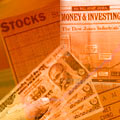China Raises Rates to Slow Inflation and Investment
 China raised interest rates for the third time in 11 months to curb inflation and asset bubbles in the world's fastest-growing major economy.
China raised interest rates for the third time in 11 months to curb inflation and asset bubbles in the world's fastest-growing major economy. The one-year benchmark lending rate will be raised to 6.39 percent from 6.12 percent, starting tomorrow, the Beijing-based People's Bank of China said today on its Web site. The one-year deposit rate will be increased to 2.79 percent from 2.52 percent. A central bank spokesman confirmed the increases.
Central bank Governor Zhou Xiaochuan is concerned that cash from a record trade surplus is stoking excess investment, raising the risk of accelerating inflation and boom-and-bust cycles in asset prices. Premier Wen Jiabao said yesterday the nation's economic expansion is unstable and environmentally unsustainable.
``The data released in the past week suggests that the economy is not actually slowing and that the government is becoming quite concerned that the economy is disproportionately driven by investment and production,'' Glenn Maguire, chief Asia economist at Societe Generale SA in Hong Kong, said today. ``The central bank will probably raise interest rates again two more times this year,'' he said.
Fixed-asset investment in urban areas climbed 23.4 percent in the first two months, down from 24.5 percent for all of 2006. China still must act to slow investment, Ma Kai, head of the National Development and Reform Commission, the country's top planning body, said last week.
Trade Surplus
China's economy, the world's fourth-largest, expanded at the fastest pace in 11 years in 2006.
``China's investment growth is too high, lending growth too fast, liquidity excessive and trade and international payments very imbalanced,'' Wen said at a news conference in Beijing yesterday. Energy efficiency and environmental protection issues haven't been ``properly resolved,'' he said.
The central bank raised interest rates in April and August and last month ordered banks to set aside more money as reserves for the fifth time in eight months to rein in the money supply.
The trade surplus surged ninefold in February from a year earlier to $23.8 billion, the second-highest on record. Money supply grew 17.8 percent, the most in six months. Inflation accelerated to 2.7 percent from 2.2 percent in January.
The rate increase ``reflects China's determination to curb inflation and prevent a rebound in investment,'' Tai Hui, an economist at Standard Chartered Bank Plc. in Hong Kong, said today. ``If inflation and investment continue to run at high numbers, there is a chance for the central bank to raise interest rates again.''
Weak Yuan
Record overseas sales are pumping cash into China's financial system, raising the risk of property and stock bubbles. The trade surplus in 2006 was $177.5 billion. Chinese stocks have touched record highs this year and also had the steepest decline in a decade.
China prints yuan to convert the foreign currency derived from exports of clothes, electronics and steel. That adds to the money supply, which last year expanded 16.9 percent. The People's Bank sells bills to soak up some of the cash.
Zhou has resisted calls from Europe and the U.S. to let the yuan strengthen at a faster pace, making China's exports more expensive.
The yuan is kept weak to make China's exports cheap, U.S. lawmakers say. America's trade deficit with the Asian nation swelled to a record $232.5 billion last year.
`Reasonable Growth'
Growth in urban fixed-assed investment declined to 24.5 percent for all of 2006 from 31.3 percent for the first six months. Still, the slowing of loans and spending is ``not stable,'' Ma cautioned in January.
``The increase in the yuan deposit and lending rates is beneficial for the reasonable growth of credit and investment, and will help to maintain price stability,'' the central bank said in its statement. ``It will help the healthy and steady development of the financial system, and will benefit economic growth and optimize the structure for fast and good economic development.''
China's economy expanded 10.7 percent last year. Gross domestic product increased 10.4 percent in the fourth quarter, slower than the previous three months and down from the second quarter's decade high of 11.5 percent.
Besides monetary policy, China uses administrative measures to rein in investment. Developers face tighter land-appreciation taxes this year and minimum prices for property to be used for industrial developments. Environmental controls will curb spending on factories, according to the central bank.

![[Most Recent Quotes from www.kitco.com]](http://www.kitconet.com/charts/metals/gold/t24_au_en_usoz_2.gif)



![[Most Recent Exchange Rate from www.kitco.com]](http://www.weblinks247.com/exrate/24hr-inr-small.gif)















No comments:
Post a Comment